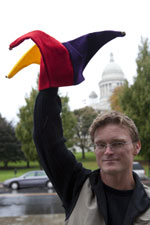As with much else, I first really turned my eye to the willow thanks to Nathaniel Hawthorne. Those who knew me young may remember that it's always been a favorite — the vine-like tentacles and gnarled trunks. There's something of the fantasy in willows, the magical. But reading his "Buds and Bird-Voices" when recently I'd finished college, back when the spring and summer betokened change, newness, and the every cycling tides of hope, I began to look to willows as a sign of spring, for if the willows were its early voice, then they must hum with the distant sound of hope approaching:
No trees, I think, are perfectly agreeable as companions unless they have glossy leaves, dry bark, and a firm and hard texture of trunk and branches. But the willow is almost the earliest to gladden us with the promise and reality of beauty in its graceful and delicate foliage, and the last to scatter its yellow, yet scarcely withered, leaves upon the ground. All through the winter, too, its yellow twigs give it a sunny aspect which is not without a cheering influence even in the grayest and gloomiest day. Beneath a clouded sky it faithfully remembers the sunshine.
Having watched the trees, 'round here, though, I wonder if Mr. Hawthorne didn't overstate with his "all through the winter." Rather, it has seemed to me that, a month or two before spring's full approach, it hints its intentions through those yellow twigs, somehow emphasizing them, as if renewed life were preparing to burst forth and waits just below the surface.
I've noticed the willows yellowing over the past few days, and although I've been taking it as a moral imperative to look for hope in all things, still I must reflect that change (much less hope) is not such a surety, come warmer weather, as I'd been trained to believe. The cycle of life, so firmly established through years of schooling, has slid into a long, long winter of variable temperature.
Awaiting the overdue spring, Nathaniel's admonition serves as a reminder, if not a lesson to which one can adhere:
In the spring and summer time all somber thoughts should follow the winter northward with the somber and thoughtful crows. The old paradisiacal economy of life is again in force: we live, not to think nor to labor, but for the simple end of being happy; nothing for the present hour is worthy of man's infinite capacity save to imbibe the warm smile of heaven and sympathize with the reviving earth.


| Sun | Mon | Tue | Wed | Thu | Fri | Sat |
|---|---|---|---|---|---|---|
| 1 | ||||||
| 2 | 3 | 4 | 5 | 6 | 7 | 8 |
| 9 | 10 | 11 | 12 | 13 | 14 | 15 |
| 16 | 17 | 18 | 19 | 20 | 21 | 22 |
| 23 | 24 | 25 | 26 | 27 | 28 | 29 |
| 30 |